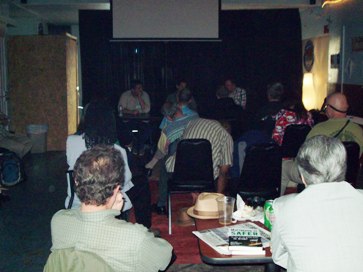Press Release: Oregon Hemp Farming Bill Becomes Law
Oregon Hemp Farming Bill Becomes Law - New State Program for Hemp Farmers to be Established
Contact: Tom Murphy at 207-542-4998 or [email protected] or Adam Eidinger at  202-744-2671 or [email protected]
SALEM, OR â Vote Hemp, the leading grassroots advocacy organization working to give back farmers the right to grow industrial hemp (the oilseed and fiber varieties of Cannabis), enthusiastically supports the decision of Oregon Governor Ted Kulongoski to sign SB 676 into law today. The bill, which passed the House by a vote of 46 to 11 and the Senate by a vote of 27 to 2, permits the production, trade and possession of industrial hemp commodities and products. With the Governorâs signature, it now makes a politically bold commitment to develop hemp in a state whose slogan is âOregon â We Love Dreamers.â
âI am glad that Oregon has joined the other states that have agreed that American farmers should have the right to re-introduce industrial hemp as an agricultural crop,â says SB 676 sponsor, Sen. Floyd Prozanski. âBy signing SB 676 into law, which passed the Oregon Legislature with strong bi-partisan support, Governor Kulongoski has taken a proactive position allowing our farmers the right to grow industrial hemp, to provide American manufacturers with domestically-grown hemp, and to profit from that effort.â The new law sets up a state-regulated program for farmers to grow industrial hemp which is used in a wide variety of products, including nutritious foods, cosmetics, body care, clothing, tree-free paper, auto parts, building materials, fuels and much more. Learn more about hemp at www.VoteHemp.com.
âOregonâs federal delegation can now take this law to the U.S. Congress and call for a fix to this problem, so American companies will no longer need to import hemp and American farmers will no longer be denied a profitable new crop,â comments Vote Hemp Director, Patrick Goggin. âUnder current federal policy, industrial hemp can be imported, but it cannot be grown by American farmers. Hemp is an environmentally-friendly crop that has not been grown commercially in the U.S. for over fifty years because of a politicized and misguided interpretation of the nationâs drug laws by the Drug Enforcement Administration (DEA). While a new federal bill in Congress, HR 1866, is a welcome step, the hemp industry is hopeful that the Obama administration will recognize hempâs myriad benefits to farmers, businesses and the environment,â adds Goggin.
Many businesses in Oregon manufacture, market and sell hemp products, including Living Harvest, The Merry Hempsters, Wilderness Poets, Earthbound Creations, Sweetgrass Natural Fibers, Sympatico Clothing, Mamaâs Herbal Soaps and Hempire. Living Harvest of Portland was recently ranked the third-fastest-growing company in Oregon, as awarded by The Portland Business Journalâs âFastest-Growing Private 100 Companiesâ annual award.  âWe are looking forward to the opportunity to invest in hemp processing and production locally,â says Hans Fastre, CEO of Living Harvest. âThis new law represents another step towards heightening the hemp industryâs profile within mainstream America and making hemp products more accessible to businesses and consumers.â
These Oregon-based companies have been on the leading edge of the growing hemp food and body care markets, which are currently estimated by the Hemp Industries Association (HIA) to be $113 million in North American annual retail sales. The HIA estimates the 2008 annual retail sales of all hemp products in North America to be about $360 million. By allowing U.S. farmers to once again grow hemp, legislators can clear the way for a âNew Billion-Dollar Crop.â
Hemp Farming Gains Support from More State Governments and Law Enforcement
According to the Illinois Valley News, Josephine County Sheriff Gil Gilbertson said that he supports the legalization of industrial hemp. âI think itâs a good idea,â Gilbertson said in the article which appeared on July 29. âI think itâs a viable crop, and the entire county could benefit from it.â
On June 9, with little fanfare, Maine Governor John Baldacci signed the Maine hemp farming bill, LD 1159, into law. Maineâs House had previously passed the bill without objection, and the Senate later passed it by a strong vote of 25 to 10. The bill establishes a licensing regime for farming industrial hemp, although the licensing is contingent upon action by the federal government. Maine had previously passed a study bill that also defined industrial hemp. Like North Dakota, the new law in Oregon does not require a federal permit to grow industrial hemp.
During the 2009 legislative session, Maine, Montana, New Mexico, North Dakota and Vermont all passed pro-hemp laws, resolutions or memorials. Sixteen states have passed pro-hemp legislation to date, and eight states (Hawaii, Kentucky, Maine, Maryland, Montana, North Dakota, Vermont and West Virginia) have removed barriers to its production or research. Like North Dakota, where farmers are in a federal court battle over their rights to grow hemp under state law without fear of federal prosecution, the new law in Oregon does not require a federal DEA permit to grow hemp.
#Â Â #Â Â #
Vote Hemp is a national, single-issue, non-profit organization dedicated to the acceptance of and a free market for low-THC industrial hemp and to changes in current law to allow U.S. farmers to once again grow this agricultural crop. More information about hemp legislation and the crop's many uses may be found at www.VoteHemp.com or www.HempIndustries.org. BETA SP or DVD Video News Releases featuring footage of hemp farming in other countries are available upon request from Adam Eidinger at 202-744-2671.


 Tvert, Armentano, Grimala
Tvert, Armentano, Grimala
